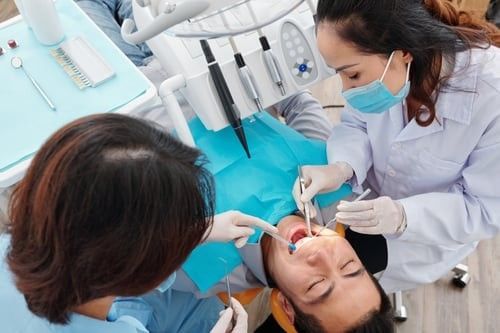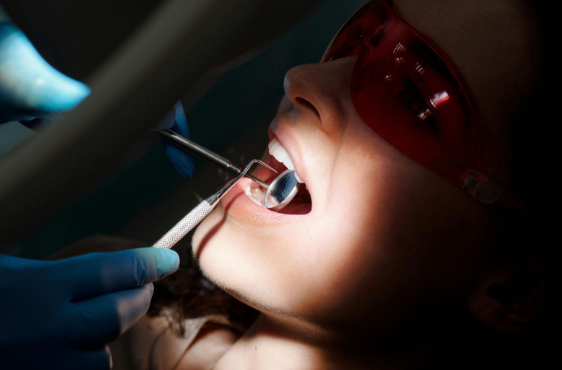Gateway Family Dental Blog

Having an occasional bout of dry mouth is rarely cause for alarm. Most of the time, it's a sign that you're slightly dehydrated or perhaps experiencing a mild side effect of a medication. The problem usually goes away with time or after you have something to drink. However, chronic dry mouth can be a serious problem and can lead to issues such as tooth decay, gum disease, and even tooth loss. While Gateway Family Dentistry can help you fight the worst of these problems, there are still some things that you can do to protect your teeth from dry mouth.
What is Dry Mouth?
Before we go any further, we should first talk about what dry mouth is and why it can cause so many problems. Dry mouth, or xerostomia, is a condition in which the salivary glands in your mouth are unable to produce enough saliva to keep your mouth comfortably lubricated. There are many causes of dry mouth, including:
● Being dehydrated
● Breathing dry air
● Medication side-effects
● Underlying health conditions, such as diabetes
● Damage to your salivary glands
The occasional dry mouth that occurs when you breathe dry air through your mouth or go too long without properly hydrating yourself is not often a cause for concern. In those cases, your dry mouth will go away if you drink enough water or do something that stimulates your salivary glands, such as chewing gum or sucking on sugar-free candy. It's when dry mouth becomes a chronic problem that you may experience some issues.
For many patients, dry mouth becomes a larger issue at night when they’re sleeping. If you sleep with your mouth open, you may not realize how dry or uncomfortable it is getting until you wake up in the morning. And after six to eight hours of breathing dry air, your mouth will dry out pretty quickly!
Symptoms of Dry Mouth
If you only experience occasional dry mouth, you will almost certainly know when you have a problem. Dry mouth is very uncomfortable, and you'll most likely want to drink a glass of water when your mouth starts to feel dry, and you feel thirsty in general. On the other hand, if you have a more chronic problem, you probably won't notice your symptoms all the time. Some of the symptoms of chronic dry mouth include:
● A dry or sticky feeling in your mouth
● Thick or stringy saliva
● Bad breath
● Difficulty speaking or swallowing
● Throat soreness
● A hoarse voice
● A grooved or dry tongue
● Changes in your sense of taste
● Difficulties wearing dentures
If you regularly experience any of these symptoms, speak to your doctor. You might have an underlying health condition that needs to be treated. At the very least, you will want to seek relief for having an uncomfortably dry mouth.
Dry Mouth and Dental Issues
Saliva is crucial to your dental health and provides a natural defense against tooth decay and acid erosion. When you experience chronic dry mouth, you lose the defenses that saliva provides. This can lead to serious problems such as tooth decay and gum disease, but it can also cause more minor issues such as dental stains when there is nothing to remove food that builds up on your teeth and bad breath.
How to Prevent Dry Mouth
As we've said before, the occasional bout of dry mouth is completely normal. Everyone has found themselves in a dry environment or gone too long without having something to drink, both of which can lead to dry mouth. You've probably had to deal with dry mouth when you've had a cold that left you too congested to breathe through your nose. It's annoying, but there are plenty of things you can do to combat the problem.
First of all, make sure to drink plenty of water to keep yourself from getting too dehydrated. You can also swish water around in your mouth while you eat to remove food particles from your teeth and keep your mouth lubricated. Avoid too much caffeine or alcohol, as both of these will dry your mouth out. The same thing goes for tobacco use since chewing and smoking tobacco can make your dry mouth symptoms worse.
Second of all, chew a piece of sugar-free gum or suck on a piece of sugar-free hard candy. Both of these will stimulate saliva production and keep your mouth from drying out. Remember to use sugar-free candies and gum, though—relying too much on sugary candy to keep your mouth from feeling too dry will cause its own share of problems.
Third, rinse your mouth out with an alcohol-free mouthwash. There are plenty of mouthwashes on the market that are designed to combat dry mouth, so look to those if you've had problems with dry mouth in the past. Avoid alcohol-based mouthwashes when possible—they might make your mouth feel clean when you use them, but the alcohol will dry your mouth out.
Finally, stay on top of your own dental care. Brush your teeth a minimum of twice a day, and floss at least once a day. It's best to brush and floss after meals, but you'll be fine as long as you stick to a routine. This might not necessarily help a chronic dry mouth problem, but it will keep your teeth clean and help avoid the many dental problems caused by a chronically dry mouth.
How to Prevent Dry Mouth While Sleeping
Most people's problems with serious dry mouth occur while they are sleeping, if only because they aren't awake to do something about it. First of all, keep drinking plenty of water and brushing your teeth during the day. Drinking water will keep you hydrated and stave off the worst of your dry mouth symptoms while brushing and flossing your teeth will help prevent gum disease and tooth decay. Next, consider the humidity in your home, particularly in your bedroom. Air that is too dry will almost certainly contribute to dry mouth at night. If your humidity is too low, invest in a humidifier, either one that affects your entire home or a smaller unit that will only affect its immediate surroundings. This is especially important during the winter when the air gets particularly dry.
Additionally, if your dry mouth is due to an underlying health issue, address it. Speak to your doctor about your health and how it could be contributing to your chronically dry mouth. If you think your dry mouth is being caused by a medication that you are taking, speak to your doctor about either finding a substitute or finding ways to counteract the side effects. Anti-anxiety medications, antidepressants, antidiarrheals, and antihistamines can all cause dry mouth as side effects.
Even if your dry mouth isn't that severe, it's important to see your doctor in order to find out if you have any underlying medical conditions. For all you know, your dry mouth could be attributed to congestion that prevents you from breathing through your nose at night. If that's the case, your doctor might be able to find a way for you to fight your allergies or your congestion so that you can breathe comfortably through your nose while you sleep. If you have a more serious condition such as diabetes that can cause dry mouth, your doctor might be able to catch it before it gets too severe.
Dry Mouth and Proper Dental Care
Dry mouth may not be caused by poor dental health, but it will definitely cause dental problems if left unchecked. If you experience dry mouth that may be affecting your dental health, don't hesitate to speak to your dentist. Even if your dentist cannot find a way to treat your dry mouth directly, they can provide you with regular teeth cleanings and give you advice on how to prevent tooth decay and gum disease. Even if you don't experience chronic dry mouth, you should still make an appointment with your dentist at least twice a year for a regular check-up.
If you are located in or around Murfreesboro or the surrounding area, and you require any dental care, contact Gateway Family Dentistry today. We provide a wide range of dental services to meet all of your needs, including those that can combat the symptoms of dry mouth. We even offer sedation dentistry services for patients who are anxious about seeing their dentist. Call us today to schedule an appointment or to ask about the services that we offer.




